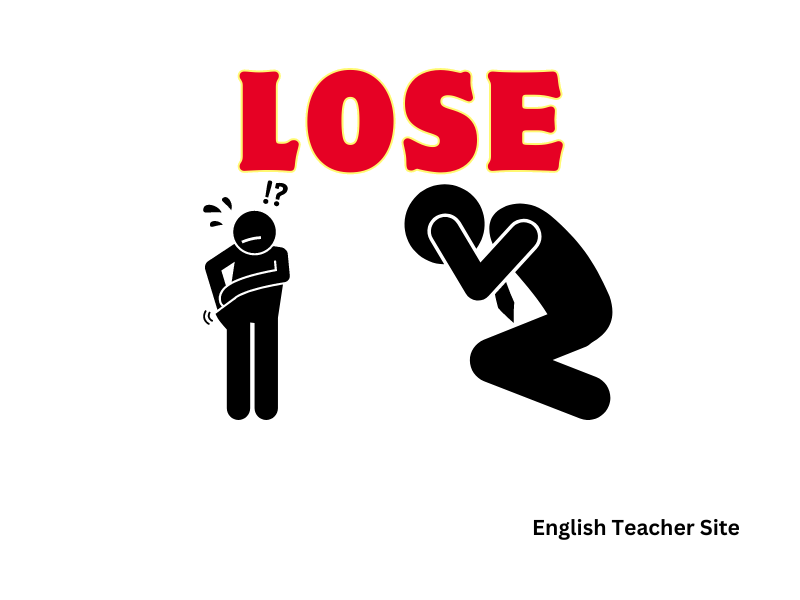Whats the Past Tense of Lose: Understanding Verb Conjugation

- The past tense and past participle of “lose” is “lost.”
- “Lose” is an irregular verb that does not follow the standard -ed pattern.
- Understanding “lost” is essential for correct sentence construction and idiomatic expression comprehension.
The past tense of “lose” is “lost,” and this form is used for both the simple past tense and the past participle. This makes “lose” an irregular verb, meaning it does not follow the standard pattern of adding -ed for its past tense forms.
Understanding the Past Tense of Lose
Lose is an irregular verb, which means its past forms do not follow the regular conjugation pattern of adding -ed to the base form.
The past tense of lose is lost. This form is used to indicate an action that occurred in the past. As with other irregular verbs, memorization is key for proper usage, since it doesn’t follow the predictable pattern. Here’s a quick reference to understand the different forms of “lose”:
| Tense | Form |
|---|---|
| Infinitive | to lose |
| Past | lost |
| Participle | lost |
For verb conjugations, “lose” changes in this manner:
- I/He/She/It lost
- You/We/They lost
To further clarify, here are examples in sentences:
- Yesterday, he lost his keys.
- She had lost patience after waiting for an hour.
Using “lose” in context often involves describing the misplacement or failure to maintain possession of an object or an abstract concept, such as a game or an opportunity.
Here are additional pointers:
- Never use “losed” – it is an incorrect form.
- “Losing” represents the present participle or the present continuous tense, as in “He is losing the game.”
- Consistency in tense is crucial for clear communication.
What’s the Past Tense of Lose?
When it comes to understanding the past tense of the verb “lose,” it is essential to recognize its irregular form. Unlike regular verbs that typically end in -ed to form the past tense, “lose” becomes “lost.” This transformation is consistent in both the past simple and past participle forms.
The Short Answer
The past tense of “lose” is expressed simply as lost. The word maintains this form regardless of the subject it accompanies. The consistency of this irregular verb can be both a convenience and a source of confusion, particularly for English language learners. To demonstrate the usage of “lost” in context, here are a few examples:
- Simple Past Tense:
- She lost her keys yesterday.
- He lost interest in the project.
- Past Participle:
- They have lost their way in the dark.
- The document had lost its significance over time.
To further clarify, a table listing the different forms of “lose” can be helpful:
| Infinitive | Simple Past | Past Participle |
|---|---|---|
| lose | lost | lost |
In sentences, the verb “lost” often follows a subject and is accompanied by objects or additional information to provide context. Here are bullet points summarizing its structure:
- Infinitive: to lose – “to lose something or someone.”
- Simple Past: lost – “Yesterday, she lost her wallet.”
- Past Participle: lost – “He has already lost the match.”
Regular or Irregular?
Regular verbs follow a predictable pattern when they change from their present to their past tense forms, typically by adding “-ed” or “-d” to their base form. For example, the regular verb “talk” becomes “talked” in the past tense.
Irregular verbs, on the other hand, do not follow these standard rules and their past tense forms can vary considerably from the base form. A student must memorize the past tenses of irregular verbs as they do not adhere to a specific pattern.
The verb “lose” is an irregular verb. Learning its correct past tense can be vital for effective communication. Below are two tables showing the verb “lose” in its various forms:
| Infinitive | Past Tense | Past Participle |
|---|---|---|
| lose | lost | lost |
| Present Participle | 3rd Person Singular Present | Simple Present |
|---|---|---|
| losing | loses | lose |
Verbs like “lose” could potentially be confusing due to their irregular conjugation. It’s important to recognize and remember that “lose” becomes “lost” in both past simple and past participle forms.
To effectively use “lose” correctly, one might find the following:
- Infinitive form: to lose
- I prefer not to lose when I compete.
- Past simple form: lost
- They lost the game last night.
- Past participle form: lost
- He has lost his keys several times.
Participle vs. Past Tense Of Lose
The verb “lose” is one such irregular verb. Understanding its past tense and past participle forms is crucial for proper grammar usage.
Past Tense of Lose:
The past tense of “lose” is a straightforward modification where the verb changes to lost. This form is used to describe an action that has been completed in the past.
- Infinitive: to lose
- Present: I/You/We/They lose; He/She/It loses
- Past Tense: I/You/We/They/He/She/It lost
Past Participle of Lose:
The past participle form of “lose” is also lost. This form is used in perfect tenses and passive voice constructions.
- Past Participle: lost
Here are two tables demonstrating the use of lost as both the past tense and the past participle in various sentence structures:
Past Tense Usage:
| Subject | Sentence Example |
|---|---|
| Singular | He lost his keys yesterday. |
| Plural | They lost the game last weekend. |
Past Participle Usage:
| Tense | Sentence Example |
|---|---|
| Present Perfect | She has lost her ticket. |
| Past Perfect | They had lost the opportunity by the time we called. |
| Future Perfect | He will have lost three pencils by tomorrow. |
Examples of the Verb “Lose”
In English grammar, the verb “lose” signifies the action of misplacing something or being defeated. This section demonstrates how to use “lose” in its various tenses.
Infinitive
- To lose
Present Tense
- He/She/It loses
- They lose
Past Tense
- He/She/It lost
- They lost
Present Participle
- He/She/It is losing
- They are losing
Past Participle
- He/She/It has lost
- They have lost
Here are two tables with sentence examples for the verb “lose” in various tenses:
Present and Past Tense Examples
| Present Tense | Past Tense |
|---|---|
| She loses her keys often. | She lost her keys yesterday. |
| They lose the game. | They lost the game. |
Present Participle and Past Participle Examples
| Present Participle | Past Participle |
|---|---|
| She is losing her patience. | She has lost her patience. |
| They are losing track of time. | They have lost track of time. |
In regular conversation and writing, the word “lose” is commonly used. Here are a few sentence examples using bullet points to showcase its use:
- I often lose my train of thought.
- She loses interest quickly.
- They lost their way in the forest.
- He has never lost a match.
Past Tense “Lost” in Sentences
The verb lose is an irregular verb, and its past tense form is “lost.” The consistent use of “lost” in the past tense simplifies learning as it does not follow a predictable pattern like regular verbs ending with “-ed.”
Usage of “Lost” in Simple Past Tense:
| Subject | Verb |
|---|---|
| I | lost |
| You | lost |
| He/She/It | lost |
| We | lost |
| They | lost |
Here are some examples of “lost” in sentences, demonstrating its versatility and clear past tense indication:
- “He lost his keys yesterday.”
- “She lost patience with the slow internet connection.”
- “They lost the game despite their best efforts.”
Incorporating “Lost” in Complex Sentences:
| Clause Type | Example Sentence |
|---|---|
| Dependent Clause | Even though they lost, they learned a lot. |
| Independent Clause | The team lost, but they remained optimistic. |
Key constructions:
- In the sentence, “She lost her way in the new city,” “lost” signifies a past event.
- “Had lost” and “was losing” are different tense constructions that can be confused with the simple past “lost.”
Participle “Lost” in Sentences
The past tense and past participle form of “lose” is “lost.” This form is employed in several tenses including the past simple and present perfect. The versatility of “lost” enriches its practicality in various contexts. Below, one will find tables illustrating the use of “lost” in different sentence constructs.
Past Simple Tense:
| Subject | Sentence Example |
|---|---|
| He/She/It | He lost his keys yesterday. |
| I | I lost the match last week. |
| You/We/They | They lost their way in the city. |
Present Perfect Tense:
| Subject | Sentence Example |
|---|---|
| He/She/It | She has lost interest in the project. |
| I | I have lost ten pounds this month. |
| You/We/They | You have lost control of the situation. |
- The participle “lost” functions as an adjective in He felt lost without his phone.
- In passive constructions, “lost” appears as The boat was lost at sea.
Sentences often utilize “lost” to convey the completion of an action, a change in state, or possession that is no longer held. The participle confers a definitive conclusion to the situation being described. It is integral to not only narrate past events but also to discuss experiences up to the present moment. “Lost” has a finality that is essential in expressing the loss or absence of something or someone.
Idioms with Lose
When it comes to the word “lose,” several idioms add color to the language.
At a loss: This means to be unsure or confused about something. For example, they were at a loss for words after the surprising announcement.
Lose face: To lose face means to be embarrassed or to lose the respect of others. Example: He was afraid to admit his mistake because he didn’t want to lose face.
Lose ground: This indicates a situation where someone or something is becoming less successful compared to others. Example: Their company started to lose ground to the competition.
Here are two tables listing common idioms containing the word “lose” and their meanings:
| Idiom | Meaning |
|---|---|
| Lose touch | To no longer be in contact or communication |
| Lose sleep over | To worry about something |
| Lose one’s bearings | To become disoriented or unsure of one’s position |
| Lose heart | To become discouraged |
| Idiom | Meaning |
|---|---|
| Lose track of time | To be unaware of the passage of time |
| Lose one’s temper | To become angry |
| Lose one’s train of thought | To forget what one was talking or thinking about |
| Have nothing to lose | To be in a position where taking a risk cannot make things worse |
Additionally, idioms with “lose” appear in everyday conversations and writing:
- Lose your cool: Referring to someone becoming angry or agitated.
- Lose the plot: Meaning someone has become irrational or is not understanding the situation correctly.
Origin of the Word/Verb “Lose”
The English verb “lose” originates from the Old English forleosan, meaning “to lose, perish,” which breaks down into for- (“completely”) and leosan (“to lose”). It stems from the Proto-Germanic *lausa-, which has connections to the Proto-Indo-European root *leu-, often associated with the concept of loosening, dividing, or cutting apart.
The development of the word “lose” reflects the process of linguistic evolution, where words transform in structure and meaning over time. Its application has broadened from strict physical loss to more abstract forms, such as losing a game or missing an opportunity.
Table 1: Etymology of “Lose”
| Old English | Proto-Germanic |
|---|---|
| forleosan | *lausa- |
Table 2: Meaning Development
| Era | Meaning |
|---|---|
| Old English | To lose, to perish |
| Modern English | To not win, to misplace, etc. |
- Old English: Focused on the loss of life or the act of perishing.
- Modern English: Encompasses a broad range of losses, including abstract concepts.
Other Commonly Confused Verb Tenses
This section explores a few verb tenses that are frequently mixed up by learners and even native speakers.
Present Perfect vs. Past Simple
One of the most challenging aspects for English learners is distinguishing between the present perfect and the past simple tenses. The present perfect is used for actions that have occurred at an unspecified time and are still relevant, while the past simple is used for completed actions at a specific time.
| Present Perfect | Past Simple |
|---|---|
| I have visited Paris. | I visited Paris in 2020. |
| She has lost her keys. | She lost her keys. |
‘Lay’ vs. ‘Lie’
Another pair of verbs that cause confusion are ‘lay’ and ‘lie’. ‘Lay’ requires an object, and ‘lie’ does not. Their past tenses are ‘laid’ and ‘lay’, respectively, adding to the confusion.
| Present (with object) | Past (with object) |
|---|---|
| Lay the book down. | She laid the book down. |
| Present (no object) | Past (no object) |
| I lie down to rest. | I lay down yesterday. |
‘Rise’ vs. ‘Raise’
Similarly, ‘rise’ and ‘raise’ are often used incorrectly. ‘Rise’ is intransitive and does not take an object, whereas ‘raise’ is transitive and requires one. Their past forms are ‘rose’ and ‘raised’.
- ‘Raise’ your hand if you know the answer (present).
- He raised his hand earlier (past).
- The sun rises in the east (present).
- The sun rose at 6 a.m. today (past).
Source
2. Harper, Douglas. “Etymology of lose.” Online Etymology Dictionary, https://www.etymonline.com/word/lose
3. “Lose.” TheFreeDictionary.com https://idioms.thefreedictionary.com/lose
My name is Khamis Maiouf. I am the creator of the English Teacher Site, dedicated to providing valuable resources and insights for students around the world. With a passion for education and a commitment to helping students enhance their skills, I aim to make English teaching more effective and enjoyable for both educators and students.






